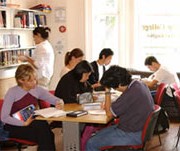Teacher Training Courses: European Languages
Cactus offers Teacher Training Courses in London for fluent speakers of French, Spanish & Italian, and Teacher Refresher Courses abroad for non-native teachers
Teacher Training Courses in London
As the population of countries within Europe and around the world continues to diversify, and as globalisation makes it normal for us to mix with people of all languages and cultures (in schools, universities and the workplace), the demand for foreign language teachers is at an all-time high. People want to learn languages and we need qualified teachers to teach them.
In response to this demand, Cactus now offers teacher training courses for fluent speakers of French, Spanish and Italian who want to teach the language as a second language to adults. No prior teaching experience is required; the only stipulation is native or near-native speaker level in the language. These courses are a great way to turn your language skills into a career in teaching whilst filling a widening hole in the market.
Teacher Training Courses – Advantages
- Following a similar format to the CELTA course for English, these courses will prepare you for teaching your chosen language at different levels
- You will observe qualified language teachers, learn how to plan a lesson and manage a class, and attend feedback and discussion sessions to help you progress
- The combination of practical classroom experience combined with teaching methodology will give you valuable skills and confidence
- You will meet like-minded people with similar goals
- You can take a full-time course (4 weeks) or a part-time course (12 weeks)
- Courses take place in London’s popular Covent Garden
- You should find it easy to obtain paid work upon completion of your course (depending on location)
For a complete list of teacher training courses in French, Spanish and Italian, including prices and start dates, please visit the Cactus TEFL website page.
Teacher Refresher Courses Abroad
 In addition to our Teacher Training Courses, Cactus also offers Teacher Training Refresher Courses for non-native teachers of French, Spanish and German.
In addition to our Teacher Training Courses, Cactus also offers Teacher Training Refresher Courses for non-native teachers of French, Spanish and German.
These courses take place in France, Spain and Germany, and provide a unique immersive environment where foreign language teachers can advance their teaching skills, learn the latest approaches and network with other MFL teachers. They are a valuable way for teachers to develop professionally and remain at the forefront of their profession.
Teacher Refresher Courses – Advantages:
- Develop your language teaching skills
- Learn the latest techniques
- Immerse yourself in the language and culture at the same time
- Great environment in which to brainstorm ideas, create activities and discuss challenges specific to teaching languages in the UK education system
- Opportunity to suggest language-related themes to include in course content
- Leave feeling inspired and informed, and ready to share everything you have learned on your return to the classroom.
Please visit the Cactus Language website for full details of our teacher training refresher courses in Europe.
If you have a language learning or language teaching query that you can’t find the answer to, please get in contact with us either by Facebook or by Twitter, or contact us here.










